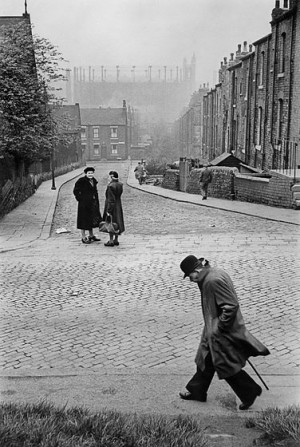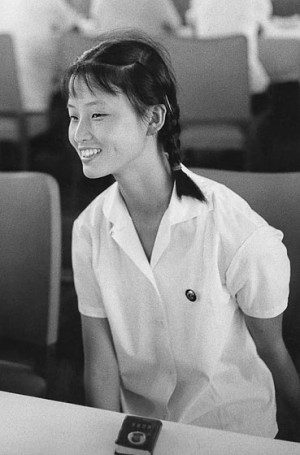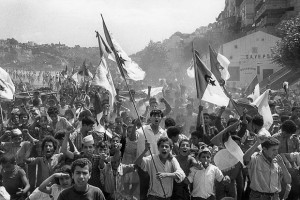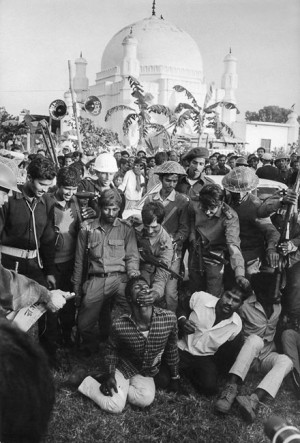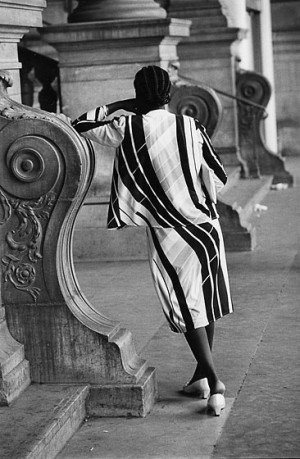Archives: Textes
Robert Capa, London, Leeds
In 1952, I took some photos of the Tignes dam and Henri-Cartier-Bresson told me, “You’re a good photographer, but if you want to join Magnum, you’ll have to see Capa.”
So I met Capa, who took me under his wing, without any lectures, but with a hearty pat on the back and an immediate order: “Go live in London. You’re too shy, you’ll see girls and you’ll learn English.”
Continue reading Robert Capa, London, Leeds >
The Young girl holding a flower
(…) It was taken on Washington, D.C., on October 21, 1967. The Indian-summer sun was shining on a vast and joyous demonstration against the war in Vietnam. There were radical students groups, civil rights activists, Black Power advocates, middle-class liberals, hippies, and government employees. There was theater, music, sessions of Buddhist meditation, plus all the chants, laughter, and hugs. There were armfuls of flowers to hand to the soldiers, there was the scent of marijuana.
Continue reading The Young girl holding a flower >
Visions of China
This is a picture book. I am a photographer, not a Sinologue. In China I did a lot of walking, a lot of looking, and I took a lot of pictures. I also drank a lot of tea while listening to endless recitations of the latest versions of the Party doctrine. I read all the right books, learned what I could from fellow travelers, shared their enthusiasms, disappointments, and bewilderments.
Continue reading Visions of China >
The choice
Choice and freedom of choice is not just an existential concern for photographers. It is a life-time preoccupation. We spend more time squinting through a magnifying glass, fretting over our contact sheets, than we do looking through the viewfinder of our camera. And the muscles of our eyes suffer as much as those of the Amsterdam diamond cutters and of the watchmakers from our childhood.
Continue reading The choice >
Algiers, July 2nd, 1962
The press photographers with their jargon were a brotherhood from which I felt excluded until, during the events of Algerian independence, I shared their passion for what was going on. An insane race to get to the head of the parade, to be in front of it, not to follow it. “If your photos aren’t good, you’re not close enough,” Capa would tell me.
Continue reading Algiers, July 2nd, 1962 >
Angkor
The stones faces look, but the bonzes ignore me. All the same, the equipment slung over my shoulder betrays the foreigner, the barbarian that I am. I n the forsaken place where solitude is common, an astonishing vision opens up before me: monks by the hundreds and pilgrims by the thousands, for three days and three nights, give voice to the silence of the ruins.
Continue reading Angkor >
A Letter from Robert Doisneau Regarding the book Gares et trains
Sunday, October 9th 1983
My dear Marc,
I like your railroad sign* a lot. In the pedestrian of Paris collection, it’s surely the one I find the most touching. Yes of course, the images wander harmoniously between graphic balance and emotion. But I am not a distributor of diplomas. Fortunately, I still have enough modesty and sense of the ridiculous to refrain from blessing or excommunicating.
Continue reading A Letter from Robert Doisneau Regarding the book Gares et trains >
Pierre Soulages looks at Marc Riboud’s photographs
Marc Riboud’s forms and compositions are intense and powerful, but one cannot consider them without what they represent, and so they encourage us to penetrate the opacity of reality.
The reality that such images at once reveal and conceal.
A reality upon which our questions and our answers are constructed and collapse, a reality that incessantly escapes us.
Continue reading Pierre Soulages looks at Marc Riboud’s photographs >
